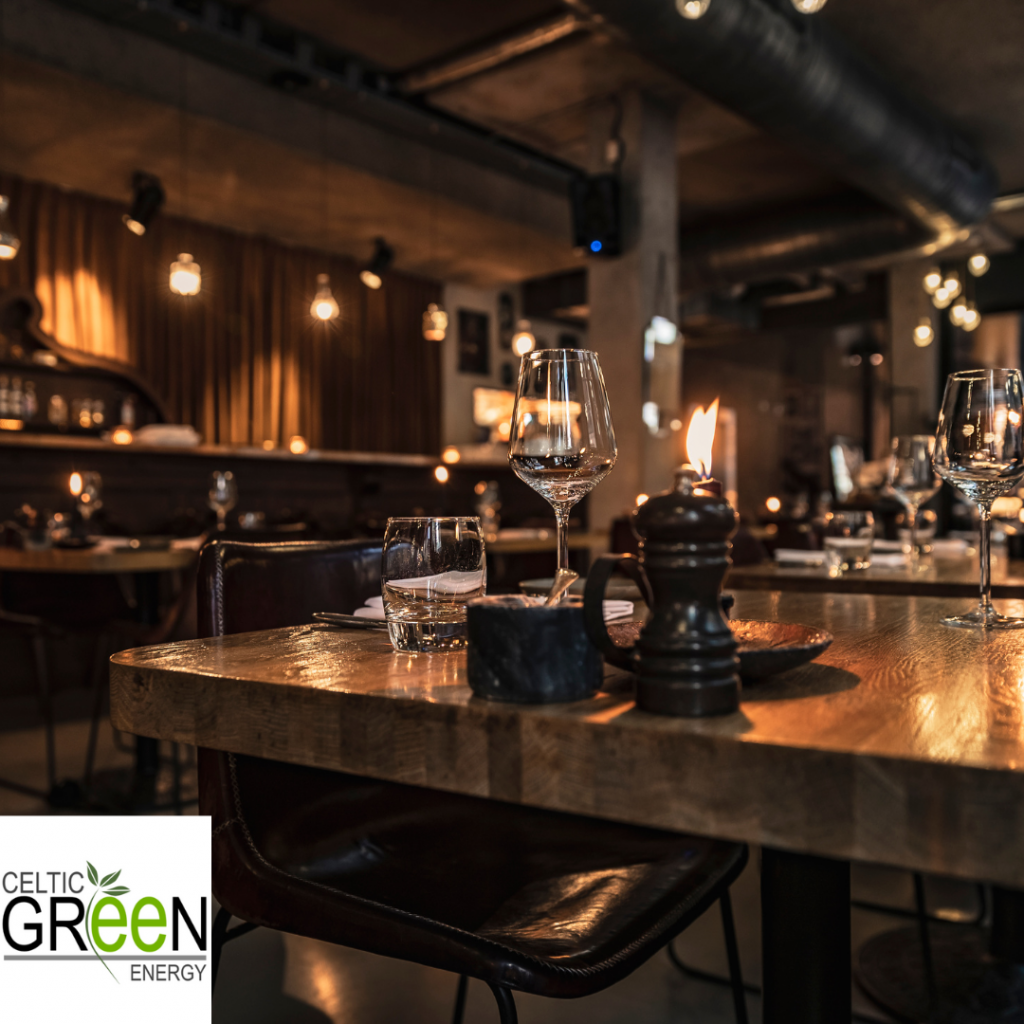Table of contents

Celtic Green Energy
Maximizing the Benefits of Solar Energy for Your Restaurant
In the dynamic landscape of the restaurant industry, ensuring consistent operations is paramount. However, power outages, whether due to inclement weather, accidents, or equipment failures, can disrupt business flow, leading to substantial financial losses. For restaurants heavily reliant on refrigeration and electrically powered equipment, even a brief outage can result in spoiled food items, exacerbating the already staggering issue of food waste, which costs the industry billions annually. So, how can restaurant owners mitigate this risk and secure a reliable power supply? The solution lies in harnessing the power of solar energy.
How Does Solar Energy Transform Restaurant Operations?
Imagine a restaurant equipped to maintain uninterrupted functionality of essential appliances such as freezers, refrigerators, ice machines, and food displays during grid power outages. With solar panels adorning the rooftop, restaurateurs not only generate their electricity but also have the capability to store it for emergencies. This proactive approach drastically reduces the likelihood of food spoilage, directly impacting the restaurant’s profitability.
Here’s a breakdown of how solar energy works in a restaurant setting:
Solar panels installed on rooftops absorb sunlight and convert it into electrical energy using photovoltaic (PV) panels or solar concentrators.
The generated electricity can be utilised instantly, stored in batteries for future use. They can even sold back to the grid, offering additional revenue streams.
While solar energy production is subject to fluctuations due to factors like weather conditions, restaurants can implement strategies to optimise their solar power usage:
Utilising weather forecasts to anticipate periods of reduced solar generation.
Employing energy storage solutions to bank excess energy for times of high demand or low sunlight.
Encouraging energy consumption during peak solar generation hours to maximize self-sufficiency.
By integrating solar energy into their operations, restaurants not only enhance their resilience against power disruptions but also contribute to environmental sustainability, by reducing reliance on traditional energy sources. Embracing solar power isn’t just a smart business move; it’s a commitment to a greener, more efficient future for the restaurant industry.
Unlocking the Potential of Solar Panels for Restaurant Owners
The versatility of solar power extends across a wide spectrum of restaurant styles, offering invaluable benefits for establishments ranging from fine dining to casual cuisine. Contrary to common misconceptions, the process of installing solar panels is remarkably straightforward and minimally disruptive to business operations. Much like the installation of new roof tiles or shingles, solar panels can be seamlessly integrated onto rooftops of various shapes and sizes, empowering restaurant owners to harness the sun’s energy efficiently.
Fine dining establishments, renowned for their meticulous attention to detail in both cuisine and ambiance, may initially express concerns about the visual impact of solar panels on their rooftop. However, this perceived obstacle can be reframed as an opportunity to showcase a commitment to sustainability, aligning with the growing eco-conscious mindset of consumers. By transforming rooftops into platforms for environmental stewardship, restaurateurs can enhance their brand identity and inspire community-wide initiatives toward sustainability.
Moreover, the financial incentives associated with solar panel installations provide additional motivation for restaurant owners to make the switch to renewable energy. Eligible businesses can leverage a federal tax credit, currently set at 26 percent of solar project construction expenses. This tax relief offers substantial savings and serves as a tangible acknowledgment of investments made in renewable energy infrastructure.
In terms of ongoing operational expenses, the potential savings on monthly electric bills are contingent upon factors such as the number and placement of solar panels relative to the building’s orientation. However, during sun-drenched days, restaurants can generate surplus energy that can be sold back to the grid, translating into additional financial returns or credits. Once the initial solar financing is amortised, restaurants stand to benefit from virtually free energy production, significantly bolstering long-term profitability.
In Conclusion
The integration of solar power presents multifaceted solutions to the perennial challenges faced by restaurant owners, including mitigating the impact of power outages and reducing operational costs associated with energy consumption. By embracing solar energy, restaurants not only safeguard their financial interests but also contribute to a more sustainable future for the industry. The time to embark on this transformative journey toward energy independence is now—empower your restaurant with solar power and reap the rewards of resilience and savings.
- Electric Vehicle Charger
- Heat Pumps
- Renewable Energy System
- Solar Energy
- Spray Foam Insulation
- Uncategorized
See this Forbes article for more information on Solar Energy: https://www.forbes.com/sites/enriquedans/2020/10/17/what-is-happening-with-solarenergy/?sh=5940e9c52f10
